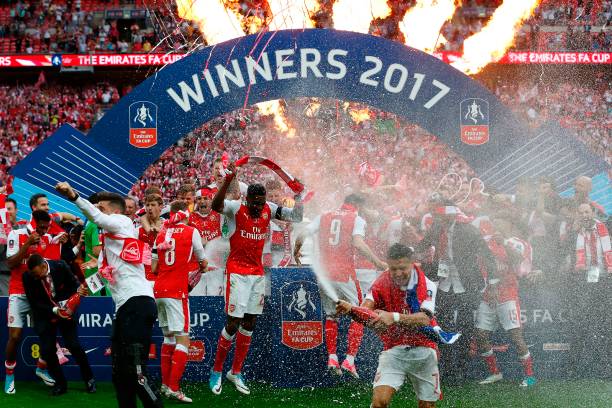The tail-end of last season was bittersweet for Arsenal supporters, with an FA Cup triumph softening a failure to attain Champions League football.
The Champions League disappointment saw Arsene Wenger on the brink before domestic achievement spared him.
April
As Arsenal left a horrific March behind them, there was a feeling things could get much worse in April. Games against Manchester City and Tottenham in the Premier League were on the horizon, and while the FA Cup proved an excellent escape, City awaited the Gunners in the semi-final at Wembley.
There was tentative hope Arsenal had put their bad form behind them when they picked up four points in the first week. A comically open game of football against City at the Emirates Stadium ended 2-2 thanks to goals from Theo Walcott and Shkodran Mustafi.
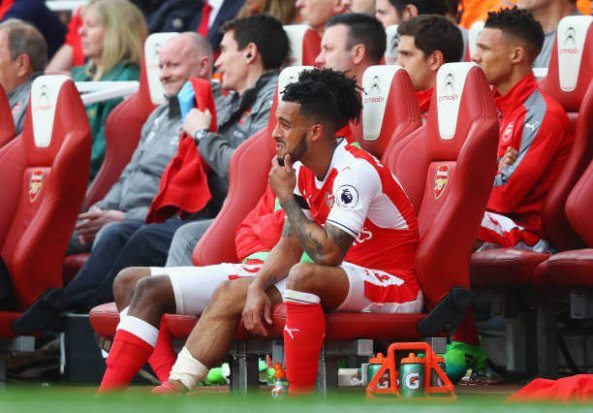
Days later, Arsenal stuck three past West Ham, with Mesut Ozil, Walcott and Giroud getting on the scoresheet. It was the first time Arsenal had managed to go two straight games without defeat since January. That hope was crushed at Selhurst Park the following weekend, however.
Palace romped to a 3-0 victory over an apathetic Arsenal, who could scarcely be bothered to compete with a team desperately fighting their way out of relegation trouble. Andros Townsend and Yohan Cabaye put the Eagles 2-0 up either side of half-time, before Luca Milivojevic added a third from the penalty spot after Emi Martinez brought down Townsend.
This defeat, watched on by Ivan Gazidis in the stand, marked the peak of the Arsenal fans’ anger. The travelling supporters had spent a good chunk of the season protesting Arsene Wenger and the board, but had always stopped short from truly criticising the players. This game proved to be the final straw, and chants of “You’re not fit to wear the shirt” was the only noise coming from the corner of Arsenal support.
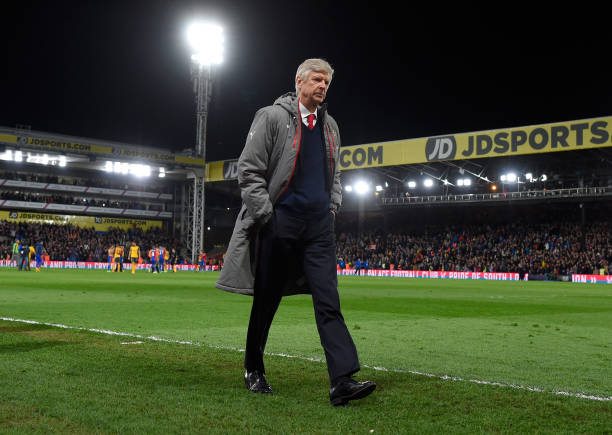
Such an extreme reaction wasn’t without merit. Arsenal’s season had imploded in spectacular fashion. They had gone from being 19 games unbeaten before the new year to being humiliated every other week. By this point, even a top-four finish was beginning to look unlikely. Wenger knew he had to change something, and on April 17th, an hour before the Gunners were due to play Middlesbrough at the Riverside Stadium, he sprung a surprise.
A change of formation is a common sight in football, but at Arsenal it was a rare event. Wenger had played a 4-2-3-1 for several years without much deviation. An occasional use of 4-1-4-1 or 4-4-2 in situations where Arsenal were chasing games was as adventurous as it got. So to see the team sheet laid out in a 3-4-2-1 before kick-off was a shock to the system.
Three at the back was en vogue in the Premier League, and Arsenal were happily hopping onto the bandwagon. Rob Holding came into the defence alongside Laurent Koscielny and Gabriel, while Nacho Monreal and Alex Oxlade-Chamberlain were the wing-backs. Ramsey and Xhaka formed the midfield pairing behind Alexis Sanchez, Mesut Ozil and Olivier Giroud.
Wenger explained that the change was needed to solidify Arsenal’s ailing defence, but also admitted that he hoped the sheer novelty of the system would give his team a jump-start. Unsurprisingly, his team lacked co-ordination in the new shape as the defenders sussed out how to work together on the fly.
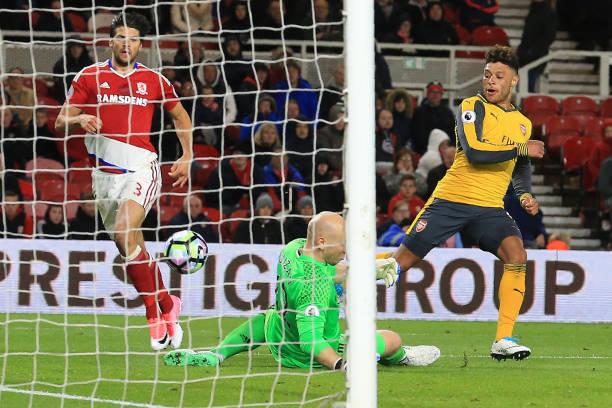
Middlesbrough’s meek attack made them a good opponent to trial a new setup, and Arsenal went in at half-time with a lead thanks to an Alexis Sanchez free-kick. The frailties came out in the second half when Alvaro Negredo equalised and Stewart Downing had a great chance to put his side ahead. Nevertheless, Arsenal just about stayed in the game, and found the winner through Mesut Ozil.
A win over a relegation-threatened Middlesbrough was much needed, but hopes leading up to the FA Cup semi-final against Man City remained low. Wenger surprised everyone again by sticking with the new formation. The fear was that the team wasn’t settled enough to cope with the threat City possessed, but with Arsenal’s season on the line, Wenger was prepared to take a chance.
The team defended well enough throughout the first half, but undid their good work after the break when Sergio Aguero tore away on a counter attack with the freedom of the Arsenal half to run into. He lobbed Cech to give City the lead, but the Gunners responded quickly.
A whipped cross from Oxlade-Chamberlain found his opposite wing-back Monreal coming in at the back post to slam in the equaliser. The game went into extra-time, where Alexis Sanchez proved his love for Wembley Stadium by scoring yet another goal there.
In a rare moment of unified joy, the fans celebrated as the team booked their place in yet another final.
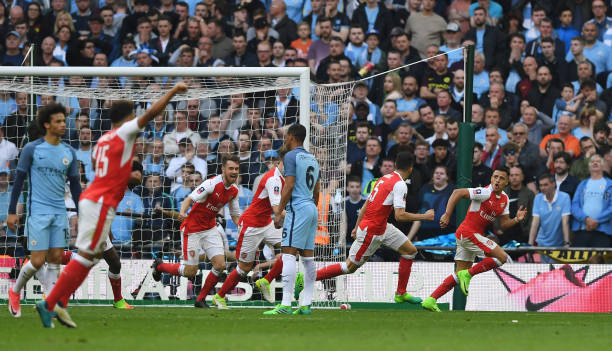
Before then, the team had to do its best to get back into the top four before the season was over. A scrappy 1-0 win over Leicester in midweek gave Arsenal some momentum going into the last ever North London derby at White Hart Lane.
Tottenham were preparing to move into a new stadium, and were not only looking to close White Hart Lane in style, but to also finish above Arsenal in the league for the first time since 1993. Wenger stuck the back three again, but it made little difference. Arsenal were outplayed by a Spurs side running on powerful emotion and deservedly lost 2-0.
May
May has been a strong month for Arsenal in recent seasons, as the team tend to enter it in fine form on the way to recovering a top four finish. This time around, Arsenal needed a few favours from Liverpool and Manchester City if there were to squeeze back into the Champions League.
With the FA Cup final to look forward to, Arsenal had to get through five more matches in three weeks, starting with the visit of Manchester United. Jose Mourinho’s side were also in contention for a top four spot, but had their attention firmly on winning the Europa League.
The team they put out at the Emirates Stadium was far from their strongest. In typical Mourinho style, United set-up to defend during the match and escape with a point. This was a strategy that frustrated Arsenal numerous times, but on this occasion they were able to overcome it thanks to a deflected long-range effort from Xhaka and a Danny Welbeck header.
Welbeck’s goal was his third against his former club since leaving them in 2014, while the win was Arsene Wenger’s first over Jose Mourinho in a competitive game. Overall, it was the perfect response to the disappointing result against Tottenham.
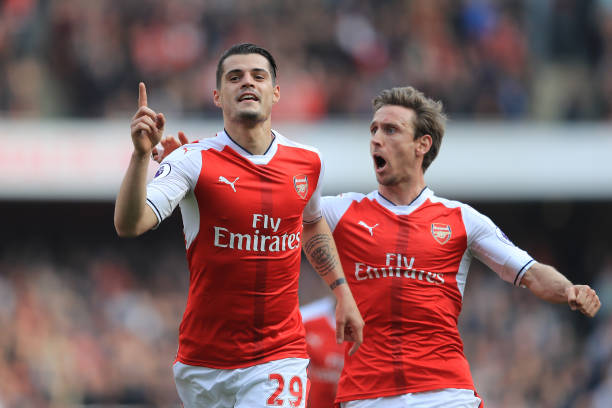
Due to their FA Cup commitments, Arsenal had several midweek fixtures to negotiate as they played catch-up with the rest of the league. The first of these was Southampton away, a fixture that hadn’t been kind to Wenger’s side since the Saints returned to the Premier League in 2012. Arsenal defeated a much-weakened Southampton side 5-0 in the FA Cup earlier in the year, but expected a much sterner test against their first team.
As it turned out, the Southampton players were already thinking about their holidays, and didn’t give Arsenal an intense game as they usually did. Two second-half goals from Alexis and Olivier Giroud gave Arsenal a comfortable victory and a feeling that they really could snatch fourth place. After all, they had just broken two long-term curses.
The following weekend would require Arsenal to break yet another as they travelled to Stoke, a ground they had won just once since the Potters were promoted to the Premier League in 2008. Arsenal took advantage of an apathetic Stoke team to win 4-1, however, with two goals from Giroud, one from Alexis and one from Ozil.
Mourinho, Southampton and Stoke defeated within seven days represented an outstanding week’s work.
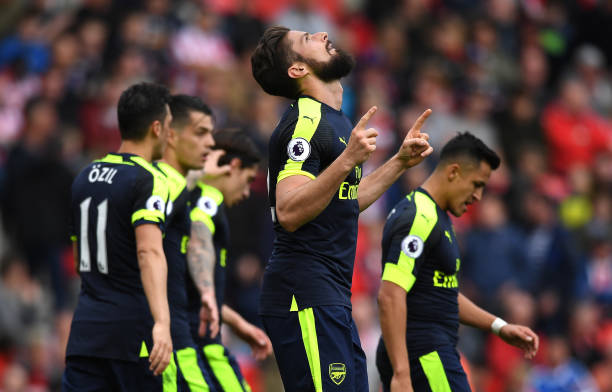
Relegated Sunderland were brushed aside the following Wednesday before Arsenal faced Everton on the final day of the season with their destiny out of their hands. They started the day in fifth, a point behind Liverpool and three behind City. City’s superior goal difference meant that their top four status was secured short of something ridiculous happening in the finale.
Arsenal needed to beat Everton and hope that Middlesbrough could hold Liverpool to at least a draw to nick the final Champions League qualifying spot. The day started off perfectly. Hector Bellerin gave Arsenal the lead after eight minutes after following up a trademark Danny Welbeck air-shot.
Things then got nervy when Laurent Koscielny timed a last-ditch tackle poorly and received a straight red card just six minutes later. Alexis Sanchez’s 29th goal of the season doubled our lead and eased the nerves a bit. Things were looking hopeful approaching half-time, until Georginio Wijnaldum put Liverpool ahead at Anfield. As far as the top four was concerned, that was that.
Liverpool would go on to win 3-0, while Ramsey crowned Arsenal’s league season off in style with a glorious curled effort. Arsenal had finished outside the top four for the first time since 1996, and would be playing Europa League football next season as a result. All that was left now was the FA Cup final.
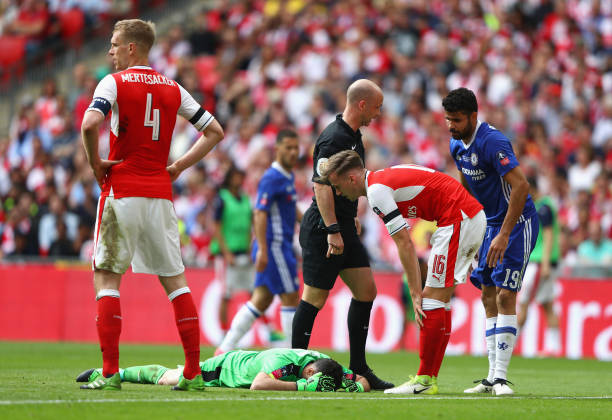
Arsenal took on a Chelsea side who had just been crowned Champions with a record points total, and were expected to win comfortably. Their team was confident and settled, while the Gunners were licking their wounds.
Koscielny was suspended, while Mustafi and Gabriel were both injured. Rob Holding and Per Mertesacker, starting his first game of the season, deputised with Nacho Monreal tucking in. Bellerin returned to right wing-back, with Oxlade-Chamberlain operating on the other side. Few expected this patched-up defence to keep Chelsea out.
Those expectations weren’t misplaced. Arsenal did concede to Chelsea, but it was ultimately a brief diversion from the real story of the game: Arsenal outplayed the champions to claim their third FA Cup in four years.
Alexis Sanchez gave them the lead in controversial circumstances, before they missed a flurry of good opportunities. Victor Moses was dismissed in the second half for diving, and when Chelsea clawed a goal back through Diego Costa, Arsenal went up the other end and scored their second. Ramsey netted his second cup-winning goal in his career, and Arsenal ended the season on a tremendous high.
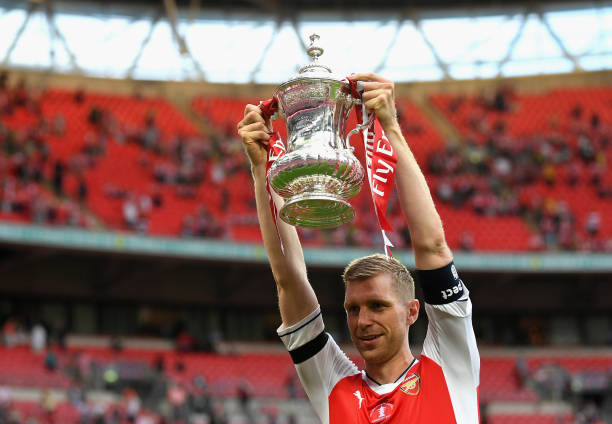
There was still one issue left unresolved: Arsene Wenger’s contract. Due to expire at the end of the season, uncertainty reigned throughout the first half of 2017. Both Wenger and the club were frustratingly elusive about whether there’d be a new deal or not. All the while, the team’s results suffered and fuelled the unease around the club. Wenger would later admit that the uncertainty over his future had a “catastrophic effect” on his squad’s psyche.
While there was a lot of speculation whether Wenger would leave and who would come in to replace him, the prospect of him not extending his contract never felt realistic. Some felt he had to leave because results weren’t good enough. Others urged the club to not offer an extension. A lot felt it was only a matter of time before Wenger extended, whether they liked it or not.
Then, on May 31, a week after the FA Cup final, Wenger signed a new contract that would extend his tenure at the club until 2019.
June
June was about as serene as it could get for Arsenal. Fans continued to debate the decision to extend Wenger’s contract but were now looking ahead to a summer of transfer rumours. There were to major questions to be answered: What would happen to Mesut Ozil and Alexis Sanchez, who both had a year remaining on their deals? And just how would Arsenal invest after finishing fifth?
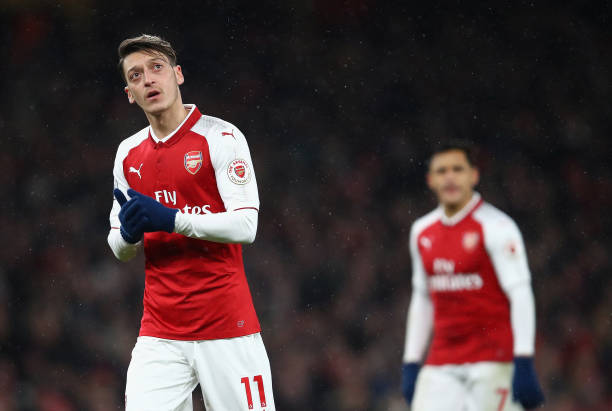
It was on June 6 that the first new signing arrived. Bosnian defender Sead Kolasinac signed on a free transfer after winding down his contract with Schalke. After that, the usual transfer shenanigans began. Arsenal were linked with every striker in Europe, including teenager Kylian Mbappe.
Mbappe was in-demand after his fantastic season with Monaco, attracting fees close to £100m. Arsenal reportedly bid £87m themselves. Few believed they really did, but for a while only they and Real Madrid were being seriously linked with the Frenchman.
As the month went on, attention turned from Mbappe to Lyon striker Alexandre Lacazette. Lyon president Jean-Michael Aulas gave a running commentary on the deal, always talking tough in response to reports that Arsenal were close to a deal.
There were other links, too. Monaco’s Thomas Lemar and Nice’s Jean-Michael Seri were supposed targets. Arsenal were shopping in France, and when a picture emerged of Wenger and Gazidis at a Nice airport, people started getting really excited.
The transfer window was in full swing.

